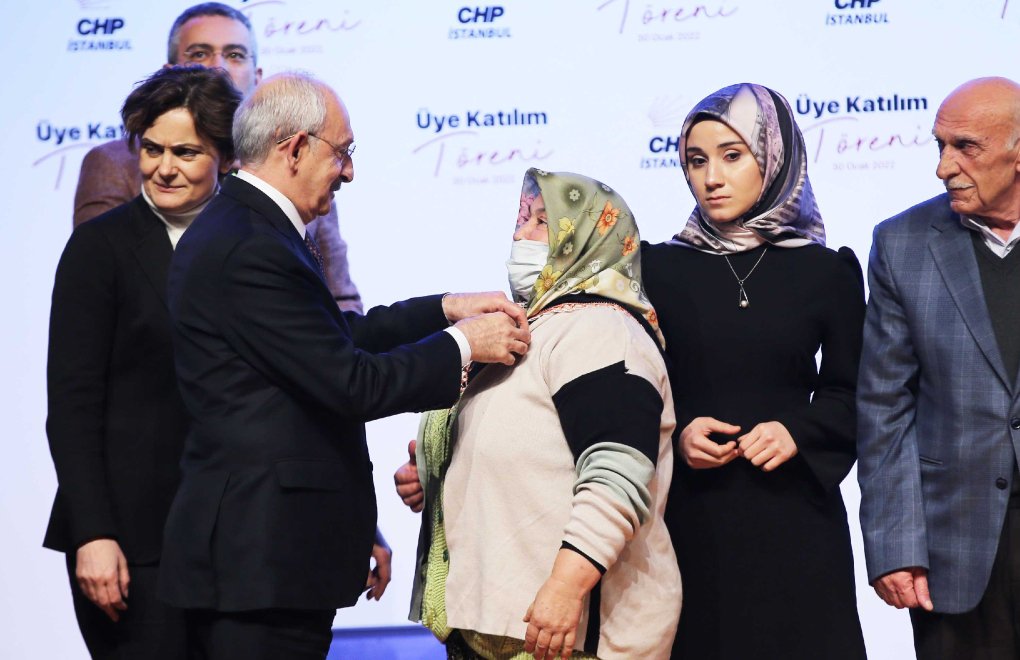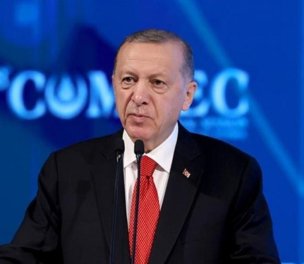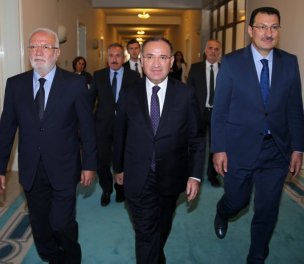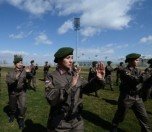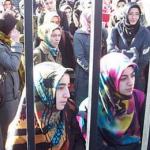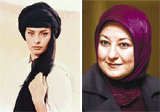Kılıçdaroğlu pinning badges to veiled women joining his party. (Photo: AA/File)
The issue of women's headscarves is once more at the top of the political agenda in Türkiye as the country is heading toward the elections.
First, Kemal Kılıçdaroğlu, head of the main opposition Republican People's Party (CHP), called for a new law that will safeguard the right of women's employment in public duties with or without a headscarf.
In a Twitter video early this month, he invited the government to support the bill they would introduce in the parliament. In his message, he conceded that his party "made mistakes in the past" about the headscarf issue.
The CHP introduced its bill to the parliament on October 4. It briefly states, "Women who work in public institutions or women who have a profession which they exercise being affiliated to professional organizations or their federations cannot be obliged to wear or not to wear any clothing other than a robe, overall or uniform which needs to be worn in that profession, in a way to violate their basic rights and freedoms."
The bill has been widely interpreted as a move to take the "headscarf card" away from President Recep Tayyip Erdoğan, who often recalls the headscarf ban in the public sector and for university students in the 1990s to keep the conservative voters from drifting away from his party.
The family and LGBTI+s
Erdoğan responded to the CHP's bill at the parliamentary group meeting of his Justice and Development Party (AKP) on October 5.
In a speech supported with videos and images including past remarks of Kılıçdaroğlu and others against headscarf, he blamed the CHP leader for "confessing sins."
"Today there is no headscarf problem on the agenda of Türkiye, thanks to the struggle we have waged. In fact, dressing in general, or wearing a headscarf is a natural right which does not need to be protected by law or by the Constitution," he said.
But shortly after he proposed to make, not a legal, but a constitutional amendment "for the freedom of wearing headscarves." On top of that, he also said, "Let us not suffice with this, let us strengthen our family institution constituted by the marriage of women with men, let us make additional changes that will make us look to our future with confidence."
Speaking in Malatya on Saturday (October 22) he gave more details: "Can there be LGBT in a strong family? No. You know which political parties are working with these circles. Let us protect our nation from deviant and perverted tendencies together. Let us put our signatures under a historical reconciliation as different political parties before the 2023 elections."
Kılıçdaroğlu on the other hand responded to Erdoğan's call, saying, "As I expected, Erdoğan, you took the issue to irrelevant points in order to be able to hold women wearing headscarf hostage. You are not sincere. You are a despot.
"I wanted our nation to see and you have shown them. Can you make a 'libertarian Constitution' by any means? You are repressive, you are a despot. You never surprise us."
Besides offering a Constitutional amendment Erdoğan also challenged Kılıçdaroğlu to take the matter to a referendum vote.
Kılıçdaroğlu responded to this challenge again from his Twitter account Saturday: "Support the bill, why should we have a referendum?... This issue will be solved if you do not flee, men will not be able to talk about women's dress anymore. Do you have that courage?"
Government's proposal
The issue, debated between the President and the leader of the main opposition, was on the agenda of the cabinet meeting held this morning.
Following the meeting, Minister of Justice Bekir Bozdağ announced that they had decided to bring a proposal to make amendments in article 24 of the Constitution saying that not only women wearing a headscarf but women who are not wearing it cannot be obliged ⦍to do the opposite⦎ in the scope of basic rights and freedoms.
He also said that another amendment will be proposed in the Constitution in order to "strengthen the family."
Bozdağ said, "The second (amendment) is in article 41. The family is the foundation of Turkish society. If we want Turkish society and the state to be strong, the family has to be strong. Not only in Türkiye but also in many countries amendments have been made in order to protect the family."
Türkiye's headscarf issueAfter the 1980 coup d'état, the military government issued a series of regulations banning women in the public sector and students in non-tertiary education from covering their heads. In the 1990s, the ban was expanded to university students, which led to widespread protests across the country. In 1999, Merve Kavakçı, who was elected an MP from the Virtue (Fazilet) Party, an Islamist predecessor of Erdoğan's AKP, was prevented from taking oath in the parliament for violating the parliament's internal regulations. When the AKP nominated then-Foreign Minister Abdullah Gül for the presidency in 2007, her spouse, Hayrünnisa Gül, being a veiled woman was at the center of the debate, with the critics arguing that it would be against the principle of secularism in the Constitution. Gül was eventually elected the president after the Nationalist Movement Party (MHP) decided to support the AKP. In the following years, the AKP gradually lifted the headscarf ban with a series of laws and regulations. Following a 2008 law, university students eventually became free to wear headscarves, despite the initial resistance from the Higher Education Council and some universities to implement the law. After the parliament passed a "democratization package" in October 2013, four of its MPs attended the parliament's General Assembly wearing headscarves. Lawyers and teachers were also allowed to wear a headscarf with the same package. After the June 2015 elections, Lütfiye Selva Çam of the AKP became Türkiye's first veiled MP to take oath in the parliament. The first judge with a headscarf was appointed following the elections in November 2015. The police and the army allowed their women personnel to wear headscarves in 2016 and 2017, respectively. Currently, there is no restriction on headscarves in the public sector. |
(VK/PE)




